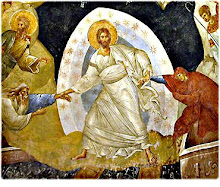
The sin that once separated us from God is best illustrated in the architecture of the Jewish Temple.
In the Temple the most central part was the Holy of Holies and this was the most sacred space of all.
It was kept separate from the people to illustrate the point that God is Holy and they are not. Their sin has kept them from fellowship with Him.
Outside of this Holy of Holies was a court in which the Priests performed their priestly duties.
Outside of this court was one in which Jewish men that were not of the priestly class could inhabit.
Outside of that court was the Court of the Women in which the Jewish women were allowed to go.
And outside of this was the Court of the Gentiles. Separating the Court of the Jews and the Court of the Gentiles was a wall of separation.
On this wall hung a sign that explained to the Gentiles that they would be killed if they entered the Court of the Jews.
In this picture of the Temple we see how man is separate from God and segregated in a way that God never wanted to happen.
God has always wanted fellowship and a familial relationship with man.
Paul takes this image of separation in the Jewish Temple and drives home a point about Jesus.
WALL OF SEPARATION
Ephesians 2: 12-19
12 remember that you were at that time separate from Christ, excluded from the commonwealth of Israel, and strangers to the covenants of promise, having no hope and without God in the world. 13 But now in Christ Jesus you who formerly were far off have been brought near by the blood of Christ.
14 For He Himself is our peace, who made both groups into one and broke down the barrier of the dividing wall, 15 by abolishing in His flesh the enmity, which is the Law of commandments contained in ordinances, so that in Himself He might make the two into one new man, thus establishing peace, 16 and might reconcile them both in one body to God through the cross, by it having put to death the enmity. 17 AND HE CAME AND PREACHED PEACE TO YOU WHO WERE FAR AWAY, AND PEACE TO THOSE WHO WERE NEAR ; 18 for through Him we both have our access in one Spirit to the Father. 19 So then you are no longer strangers and aliens, but you are fellow citizens with the saints, and are of God's household
Through the fleshly body of Jesus and His sacrifice He took on the curse of the Law.
The Scripture tells us that Jesus came to uphold and fulfill the Law.
It is best understood as God’s Law being a consuming fire. Just like the burning bush.
Israel was consumed by this fire of God’s holiness because they could not fulfill the requirements. Jesus stepped into that fire of God’s Law and stood strong and was able to do what Israel could never do. Not only did He fulfill the Law perfectly but He also took on the curses that we could not endure. He bore it perfectly and destroyed that barrier.




